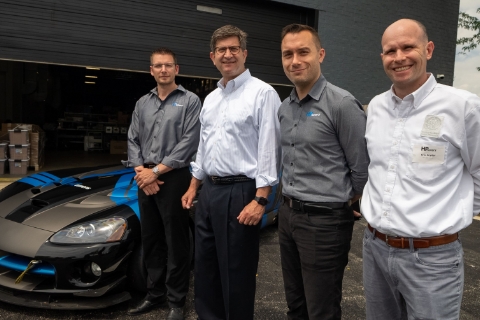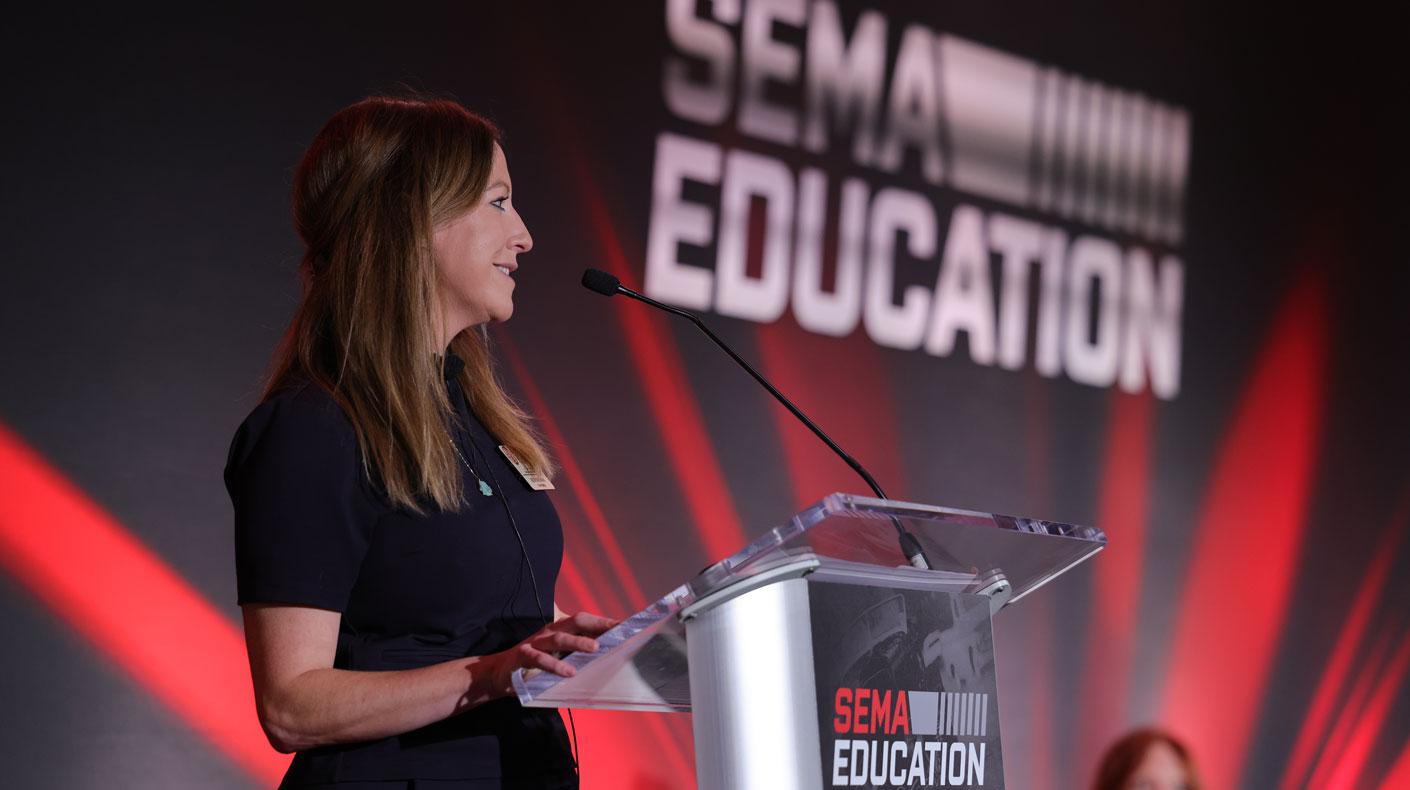FROM THE HILL
Richard Petty Goes to Washington
“The King” and SEMA Push to Pass the RPM Act in Meetings With Congressional Representatives
By SEMA News Editors
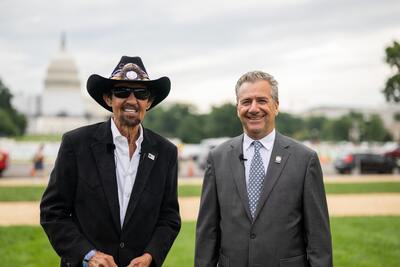
Advocating for the motorsports community, former stock-car-racing driver Richard “The King” Petty (left) and SEMA CEO Mike Spagnola arrive in Washington, D.C., as part of an industry delegation pushing the immediate passage of the Recognizing the Protection of Motorsports (RPM) Act.
Like most NASCAR drivers, Petty competed in race cars that started out as street-legal vehicles. The U.S. Environmental Protection Agency (EPA) maintains the position that such modified race vehicles are not legal under the Clean Air Act, threatening many classes of racing along with an industry that employs tens of thousands of Americans and contributes more than $2 billion to the U.S. economy each year.
Petty, Spagnola and other industry advocates sat down with key members of the U.S. Senate and House of Representatives to speak for the interests of racers, enthusiasts, builders, tracks, sanctioning organizations and businesses, while also looking to gain stronger congressional support to protect one of America’s oldest pastimes and hobbies: motor-vehicle racing. In an effort to curtail the EPA’s overreach and extreme enforcement of the Clean Air Act, Petty and Spagnola emphasized the urgent need to pass the RPM Act, which awaits committee action in both chambers of Congress.
The RPM Act reverses the EPA’s interpretation that the Clean Air Act does not allow a motor vehicle designed for street use—including a car, truck or motorcycle—to be converted into a dedicated race car. This American tradition was unquestioned until 2015 when the EPA took the position that converted vehicles must remain emissions-compliant, even though they are no longer driven on public streets or highways.
“The EPA is overstepping its jurisdiction and penalizing small motorsports parts businesses,” said Petty. “The RPM Act is essential to the racing industry and protecting the careers of young racers all over the country. During most of my racing career, my fellow NASCAR drivers and I competed in race cars that started out as street-legal vehicles.”
Petty and SEMA met with a bipartisan bevy of key congressional members. They included: Sen. Richard Burr (R-NC), RPM Act lead sponsor; Sen. Thom Tillis (R-NC), RPM Act original co-sponsor; Sen. John Barrasso (R-WY), Senate Republican Conference Chairman and RPM Act co-sponsor; Indiana Sens. Todd Young (R-IN) and Mike Braun (R-IN), RPM Act co-sponsors; Sen. Joe Manchin (D-WV), RPM Act original co-sponsor; House Minority Leader Kevin McCarthy (R-CA); House Minority Whip Steve Scalise (R-LA); Rep. Patrick McHenry (R-NC), RPM Act lead sponsor; Rep. Richard Hudson (R-NC), RPM Act lead Republican co-sponsor; and RPM Act original co-sponsors Rep. Markwayne Mullin (R-OK), Rep. Ted Budd (R-NC), Rep. Doug LaMalfa (R-CA), and Rep. Bill Posey (R-FL).
“The RPM Act will save the livelihood of thousands of Americans, including many young race-car drivers,” said Spagnola. “SEMA is dedicated to ensuring our industry remains viable. Racers and the businesses that make motorsports possible deserve clarity in federal law that protects the ability to convert street vehicles into dedicated race cars and sell products for these track vehicles without fear of enforcement.”
Both Petty and Spagnola were optimistic about their meetings with RPM Act supporters in Congress. “Motorsports has many strong allies in Congress. It was valuable for Mike and me to sit down with these lawmakers to discuss how we can work together to pass the RPM Act this year,” shared Petty.
Clearly, Petty made a huge impression on those he met with. “Walking the halls of the capitol with Richard Petty was an unforgettable experience,” said Dan Ingber, SEMA/PRI vice president of government and legal affairs, who also joined Petty on the Hill. “Even the most stoic lawmakers couldn’t hide their excitement to meet The King, as House and Senate members approached him in the halls for pictures, a quick conversation, and one congressman even had Mr. Petty sign a miniature No. 43 car. Another lawmaker who is typically very serious, reminisced about a 1972 NASCAR race in the presence of his idol.”
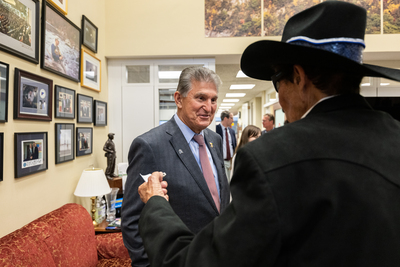
Making his Capitol Hill rounds, Petty (right) met with a bevy of key lawmakers on both sides of the political aisle, including Senator Joe Manchin (D-WV). The King found many receptive ears.
Building Momentum
The SEMA and Performance Racing Industry (PRI)-backed RPM Act was introduced in the House of Representatives by U.S. Representatives Patrick McHenry (R-NC) and Raul Ruiz (D-CA) in May 2021. Although simple and straightforward, like many pieces of legislation, its route to passage has been anything but. While conceding that its forward pace can at times seem glacial, SEMA/PRI Director of Congressional Affairs Eric Snyder believes momentum for the RPM Act is now reaching the tipping point.
“We are engaging in high-level conversations with some of the most important policymakers on Capitol Hill about the RPM Act. The meetings and dialogue we are having is very encouraging, but we must continue to apply grassroots pressure on the principal decision makers. We don’t want to wait until the next Congress. It has to happen now.”
Snyder added that more than a million-and-a-half people who support racing, and earn their livelihoods from it in many cases, have spoken loud and clear for the legislation. “For a whole lot of lawmakers, the RPM Act is one of the top issues that they’re hearing about. They’re familiar with the bill and are noticing the uptick in enthusiasm for the RPM Act, thanks to all of the outreach from SEMA, PRI and the racing community. We are focused on leveraging this enthusiasm and excitement into Congressional action.”
At press time, 129 House members from both parties are co-sponsoring the RPM Act. Including Senate supporters, more than 160 members of Congress are publicly supporting the bill. Not surprisingly, many of them represent states or districts that have a strong racing presence that includes tracks, racers and racing-equipment makers. According to Snyder, Indiana, North Carolina, California, Ohio, Texas, Florida and Pennsylvania are among the key states coming to the table.
“Indiana and North Carolina are synonymous with motorsports and have really strong representation on the bill,” he explained. “The U.S. Senators from both states are RPM Act sponsors, along with a number of their House members. Some people might not think California is the lifeblood of racing, but it’s home to more than 60 race tracks! Wherever there’s racing, chances are you’ll find lawmakers who are supportive of the bill. California leads the way with 15 members of the state’s congressional delegation serving as RPM Act co-sponsors.”
But moving the law forward has also been an exercise in strategizing. “There are 535 members of Congress, and the reality is, they’re not all equal when it comes to policymaking on certain issues,” Snyder said. “We’ve been focused on committees with jurisdiction on this issue, as the members on these committees have a greater voice on our efforts to protect racing. And the reality is, the voices of lawmakers who are going to have competitive re-elections count a bit more as well. That’s just the nature of the legislative process. You can’t divorce the politics from the policymaking.”
Which is why letters, emails and calls, in addition to buttressing the RPM Act via social media, still count for a great deal in the ongoing legislative process. With that boost, Snyder is cautiously optimistic that the bill will finally become federal law. “If they put this bill up, we have the votes to pass it through committee and on the floor of both the House and Senate,” he predicted.
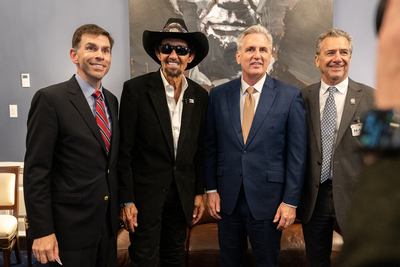
Richard Petty’s bipartisan visits included a meeting at the U.S. Capitol with House Minority Leader Kevin McCarthy (R-CA, second right). They are flanked here by SEMA Board of Directors member Ted Wentz III (left) and SEMA President and CEO Mike Spagnola (right).
Indeed, Snyder believes the industry is playing an extremely strong hand. The bill has been circulating for a few years now, and SEMA and PRI have redoubled their efforts to propel it over any remaining hurdles. The formula for success in Washington, he said, is to build a critical mass of engaged voters that can’t be ignored—something the industry is now accomplishing.
Lawmakers know the RPM Act and the passion behind it,” he explained. “They are very aware that the racing community isn’t going away until the RPM Act is enacted into law. Ultimately, this is about persistence and using our strength in numbers to ensure that lawmakers understand that the motorsports industry is large, well organized, and expects them to pass the RPM Act in 2022.”
On Tuesday, July 19, Richard Petty, “The King,” joined SEMA President and CEO Mike Spagnola in the nation’s capital to lobby Congress to pass the Recognizing the Protection of Motorsports (RPM) Act. The bipartisan bill (H.R. 3281/S. 2736) protects Americans’ right to convert street vehicles into dedicated race cars and the motorsports-parts industry’s ability to sell products that enable racers to compete. The Washington, D.C., visit came at a critical juncture for the bill, which has been steadily gaining traction among lawmakers.
Keep the Pressure Going
With the 2022 mid-term election only weeks away, now is the time to put the pedal to the metal and remind your members of Congress that you want the Recognizing the Protection of Motorsports Act (RPM Act, H.R. 3281 and S. 2736) passed now.
The act enjoys strong bipartisan support in the 2021–2022 session of Congress, but SEMA members and the racing community must turn up the pressure to pass the bill this Fall. Even if you’ve already encouraged your lawmakers to support the legislation, now is the time to reassert its importance. Here are things you can do today:
- Invite your members of Congress to visit your business or participate in a virtual meeting with your lawmaker and SEMA staff. Email erics@sema.org for a template and more information.
- Call and send a letter to your lawmakers at www.saveourracecars.com. A letter has already been drafted. It takes less than a minute.
- Sign a letter to your lawmakers on company letterhead. Email erics@sema.org for a template and more information.
- Post about the RPM Act on your company’s social-media accounts using the digital assets toolkit at www.sema.org/rpmtools.
For more information about the RPM Act, visit www.saveourracecars.com.
Editor’s Note: Writer Jim Donnelly and PRI Magazine contributed to this reporting.



